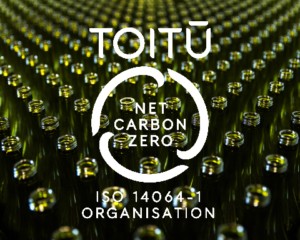Sustainability has always been a key focus for WineWorks, it aligns with our culture of continuous improvement; to always question how we can improve our processes to deliver the best value to our clients.
We have been proud of our recycling programme where all our timber, cardboard and glass waste is recycled here in New Zealand, along with the majority of our plastic waste (we still need to send PET label backings to Australia for recycling, and some other small waste streams).
We have joined the Toitū Envirocare carbon reduce programme, to start measuring and reducing our greenhouse gas emissions. We have now taken the next step and offset our emissions to become the first Toitū net carbonzero certified bottling company in New Zealand.
We see this as an important step in doing our bit for the industry, our communities and the environment.
We’re now working on a range of initiatives to reduce our emissions at each plant. We committed to reduce our carbon emissions by 30% by 2023, and have now achieved 36% by the end of 2022!

What does net carbonzero mean for our customers?
The Toitū net carbonzero certification is a way for us to understand what our emissions are and ensure we have a plan to reduce them. Taking the next step to offset them shows we recognise the impacts our emissions have, and are actively mitigating them.
Certifying this through a recognised scheme means our customers;
- Our customers can go to their clients and consumers and say their bottler is net carbonzero
- WineWorks’ continued focus on sustainability will drive efficiency as we continue to look for better ways to deliver our services.
- WineWorks’ are supporting New Zealand Wine Growers’ industry goal to be carbon zero by 2050.
Investing in Carbon Credits
While we continue to work on reducing our emissions, we offset our baseline emissions through purchasing carbon credits. It was important for us to invest the offsets with New Zealand projects where possible (80%), and the balance in high quality international initiatives;
- 40% with Spray Point Station: Named after the Spray River on which the property boundaries, Spray Point Station is a family owned and operated working farm in the upper Waihopai Valley in Marlborough. A former grazing block has been fenced off and registered for carbon sequestration, which offers another point of diversity for the farm alongside accommodation, hunting and tourism.
- 40% with Native Forest Restoration Trust’s Puhoi Far North regeneration project. Located 40 minutes east of Kaitaia, the Puhoi Far North Reserve is almost 300 ha of mature forest and regenerating shrub land. Purchased in 1995 to save it from logging and pine plantation it is now one of the largest privately protected bush areas in the Far North and boasts an array of recognised special biological values.
- 10% on a fair-trade project based in India, moving communities to renewable biogas cookstoves, and
- 10% on a portfolio of Gold Standard international projects, including the establishment of wind and solar energy programmes.
AT WINEWORKS OUR ENTHUSIASM, EXPERIENCE AND EXPERTISE MAKE IT EASY FOR YOU.
